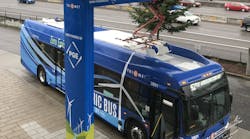TriMet proposes FY 2024 budget includes service improvements, fare increase
TriMet’s Fiscal Year (FY) 2024 proposed budget totals $1.92 billion and includes $817.3 million for day-to-day operations as the agency continues to bring on new bus operators and begin adding back service for the first time since August 2020. The proposal also includes $322.3 million for capital investments.
The coming year will bring the first of several service improvements coming out of TriMet’s Forward Together Service Concept. The agency also expects to complete the “A Better Red” MAX project, expand investments in bus electrification and continue efforts to help riders with low incomes access transit.
The proposed budget balances priorities with the agency’s ongoing efforts to restore the workforce, increase ridership and maintain a transit system that is safe, welcoming and accessible to all.
FY 2024 resources
The proposed budget does assume a fare increase that includes TriMet’s first increase of the base fare in more than a decade, which the TriMet Board of Directors will vote on at its May 24 meeting. If the board does not move forward on the fare increase, TriMet’s Finance Department is prepared to revise the budget for board adoption in June. Local law requires the budget to be in place before the FY begins on July 1.
Resources supporting the FY 2024 budget include:
- $77.1 million in operating revenue
- $515.8 million in tax revenues
- $157.3 million in federal funding
Funding priorities
The FY 2024 budget lays out priorities under four main categories:
- Transit service
- Transit equity, inclusion and community affairs
- Capital investments
- Electrification
Transit service- In addition to maintaining current levels of service across TriMet’s 533-square service district, TriMet plans to begin restoring service hours that were cut in 2021 due to ridership declines from the COVID-19 pandemic, and in 2022, due to the agency’s historic operator shortage. The FY 2024 budget begins to roll out plans from the agency’s Forward Together Service Concept, which was developed to better serve riders based on travel patterns that changed during the COVID-19 pandemic. The first package of service changes is scheduled to begin in September.
Transit equity, inclusion and community affairs- Since TriMet opened its reduced fare to riders who qualify based on income in 2018, nearly 50,000 have signed up to ride for significantly less. The Honored Citizen reduced fare, which is also open to seniors age 65-plus, people on Medicare and people with disabilities, cuts the cost of riding monthly and annually by as much as 72 percent. TriMet’s FY 2024 budget continues to support riders who are struggling financially through the agency’s Access Transit Program, which work with local nonprofits and organizations to get free and reduced fares to riders who need them.
Capital investments- TriMet plans to complete most of the remaining construction for the “A Better Red” MAX Extension and Reliability Project during FY 2024, which continues through June 30, 2024. Once finished, the project will improve reliability of the entire MAX system by adding new sections of track to alleviate choke points and extending the MAX Red Line to Hillsboro/Fair Complex, which will give more people a one-seat ride to Portland International Airport and provide more service in Hillsboro.
Electrification- TriMet will shift its bus electrification program into higher gear during FY 2024, as the agency accepts delivery of 24 new battery-electric buses. The buses make up TriMet’s first bulk purchase of electric vehicles since adopting its plan to fully transition to a zero-emissions bus fleet by 2040. In addition to buying battery-electric buses, electrification requires significant investments in infrastructure and training to charge and maintain the buses.



